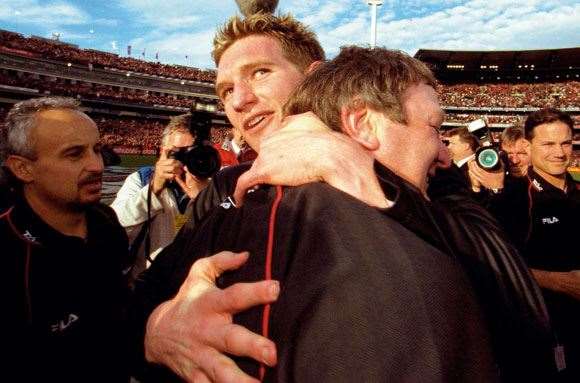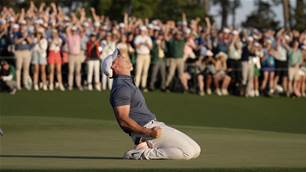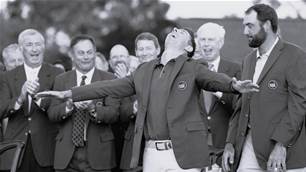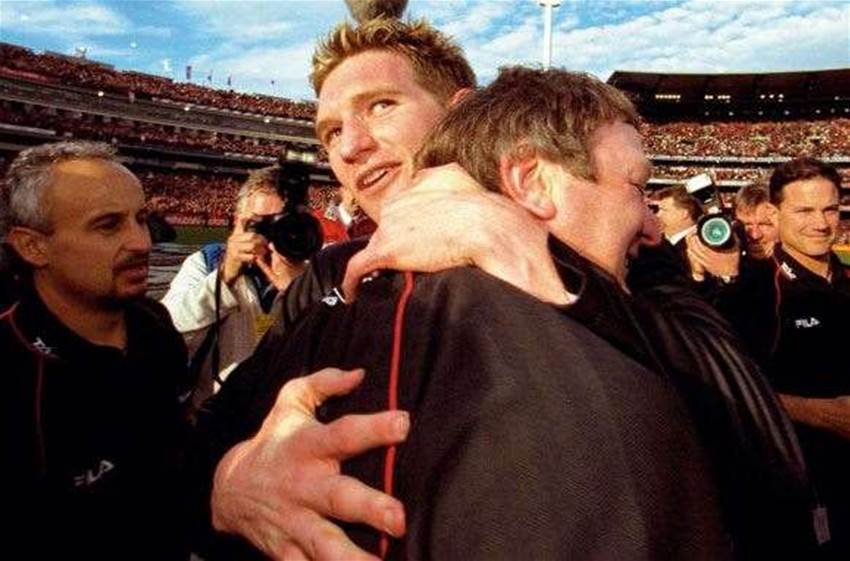Few players’ careers in football take-off upon retirement like Kevin Sheedy’s did. but then again, there’s no one in the AFL like Sheeds.
Few players’ careers in football take-off upon retirement like Kevin Sheedy’s did. but then again, there’s no one in the AFL like Sheeds.
 Sheeds and James Hird celebrate a premiership in 2000
Sheeds and James Hird celebrate a premiership in 2000Images: Getty Image
As a footballer, Kevin Sheedy was a backman of limited physical attributes – normally the profile of a plodder, a hard-working, valuable team member destined never to appear on the “greatest team ever” list. But Sheedy compensated for common abilities with uncommon ingenuity. His playing career was studded with moments of sheer innovativeness, insight and heroism.
He was considered shifty, tough and ruthless. Yet it’s a tribute to his genius at penetrating the opposition’s psyche, rather than his deviousness, that he got away with the things he did and was never reported.He was one of the first to gain admission to the Tigers’ pantheon, and was always going to be a great coach.Still, little did anyone suspect in 1981, when the recently-retired Richmond champion became coach of the Essendon side, that Sheedy would re-define the role, and in doing so, transform VFL/AFL football forever, accelerating its progress into the 21st Century.
He explored the theories of the best thinkers and coaches in all sports, here and abroad. Always open to influence, he’d recognise the right man for the moment, and has been known to call discarded (Barnes and Salmon) or retired (Watson) players back to the club. The comebacking Watson and Barnes featured in the 1993 and 2000 premiership wins respectively.If an island populated with eight-footers was ever discovered, anthropologists would’ve been dismayed to find Sheedy and his football department already crawling all over it. He turned accepted notions of indigenous players on their heads, and during his tenure as the Bombers’ coach, welcomed aspiring players from places as far-flung as Ethiopia, South Africa, Japan, Ireland and the USA.
After only two seasons at the helm he steered the Bombers to a grand final against Hawthorn in 1983. The next year, his match-day acumen turned an almost-certain loss to the powerful Hawthorn lineup into a premiership victory, when he pulled off outrageous position changes, swinging four of his defenders forward in the final quarter
– after a three-quarter-time brawl. The Bombers abruptly shifted a gear and spectacularly crushed the feared Hawks, turning a 23-point deficit at the last break into a devastating victory, with a record 9.6 in the final quarter.
Part psychologist, historian, humanitarian, visionary and sport scientist, Sheedy renewed himself at times when he was thought stale. For 27 years he endured boardroom manoeuvrings, occasional bad press, controversies and the acrimony of players – Derek Kickett, who was dropped for the 1993 grand final, is a conspicuous example – to lead the Bombers to four premierships and three runners-up medals. Until his final game in the last round of 2007, Sheedy had coached the Bombers for 629 games, second only to Collingwood’s Jock McHale.
His ability to replenish himself and regenerate the team was unrivalled. Just when everyone was “over” him, his ingenious recruiting and newfound vision for his team led the “baby Bombers” to the unexpected 1993 premiership. But Sheedy’s true legacy has been as an ambassador. He was always a resourceful man, his career a salmagundi of sometimes bizarre and seemingly incompatible ingredients. He’s been simultaneously ruthless and compassionate, casual yet punctilious, honest and outspoken, but always with a suggestion of theatrical license.
He added appeal to matches that otherwise might’ve been inconsequential. Where there was no traditional rivalry with a non-Victorian club, he would create one, as he did with the Eagles, beginning in the late 1980s, when the windsock was mysteriously tied down at the school end terrace at Windy Hill to conceal the wind’s direction. He’s not about to disabuse anyone of the idea that he was behind it.
He was a master of the symbolic, and once, when Essendon defeated the now-powerful Eagles at Subiaco after the siren in 1993, he celebrated what he saw as a re-assertion of Victorian superiority by swinging his Bombers jacket over his head as he ran down the race. The practice continues to this day as a symbolic gesture, carried on by victorious fans.
Sheedy created a profitable tension between Essendon and North Melbourne in a 1998 final by referring to the Kangaroos’ administrators as “marshmallows”, and as a result, was showered with the soft confectionary by North supporters after the match. When faced with the opportunity to criticise umpires in the new, legalistic and heavy-handed AFL, he used the code-word “Martians”, substituting little green men when referring to the men in white.
Although he was finally sacked by the Bombers – prematurely, many believe, after an eventful and entertaining 27 years – Sheedy has remained a force in AFL football and Australian sport. He’s currently coach-in-waiting for the western Sydney team. It’s an intimidating challenge, but his place in history is secure.
– Robert Drane
Related Articles

Feature Story: Moving the Needle

The Aussies at The Open


.png&h=115&w=225&c=1&s=1)










